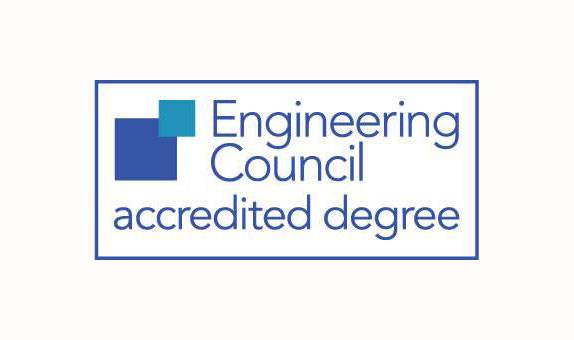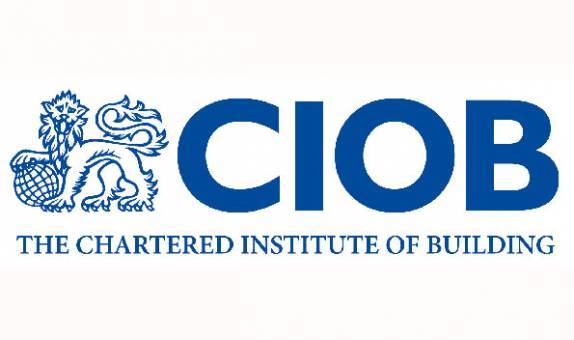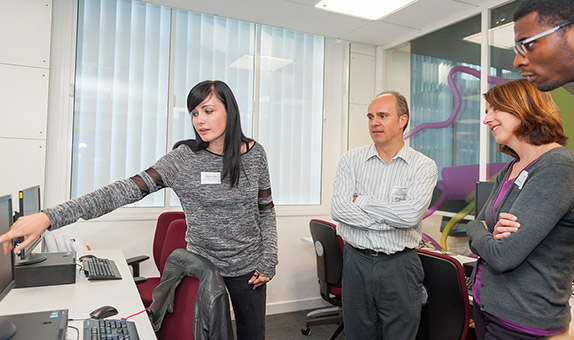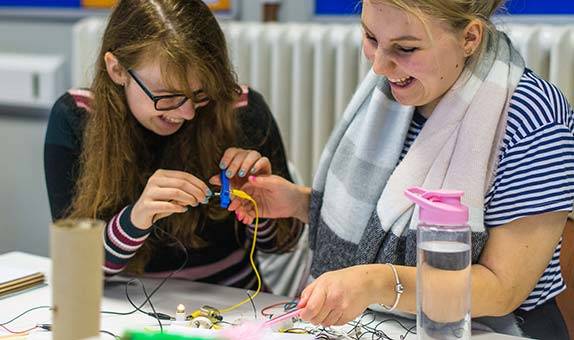Structural Design and Construction Management MSc
Why choose this course?
This industry-accredited course is tailored to civil and/or structural engineers wishing to become senior managers in both consulting engineering and contracting organisations. It is ideal for graduate engineers starting their career in the construction industry.
You will study the design of both standard and innovative structures and substructures, in normal and earthquake contexts, using steel and concrete. You will also examine the financial, legal and contractual aspects of the construction process. Gaining a knowledge of management techniques and contract administration, you will practise the supervision of construction projects.
Experts at leading civil engineering and construction companies contribute to the course, enabling you to develop a wider perspective and understanding of the worldwide issues facing the construction industry. Through an industry-relevant dissertation, you will be able to extend your knowledge in a specialist area.
| Mode | Duration | Start date |
|---|---|---|
| Full time | 1 year |
September 2024 January 2025 |
| Full time | 2 years including professional placement |
September 2024 January 2025 |
| Part time | 2 years |
September 2024 January 2025 |
| Main Location | Penrhyn Road |
Reasons to choose Kingston University
- This industry-accredited course is ideal for graduate engineers starting a career in the construction industry.
- You will gain a strategic overview of construction management issues alongside advanced structural engineering, preparing you to work at managerial level for a consultant or contractor.
- The course meets the requirements for Further Learning for a Chartered Engineer (CEng) if you already have an Accredited CEng (Partial) BEng (Hons) or an Accredited IEng (Full) BEng/BSc (Hons).
Accreditation
Further learning programme – MSc
This course is currently undergoing routine JBM accreditation renewal for 2025 entry.
This degree is accredited by the Joint Board of Moderators (JBM), comprising the Institution of Civil Engineers, Institution of Structural Engineers, Institute of Highway Engineers and the Chartered Institution of Highways and Transportation, on behalf of the Engineering Council, as meeting the requirements for Further Learning for a Chartered Engineer (CEng) for candidates who have already acquired a partial CEng accredited undergraduate first degree.
It should be noted that candidates completing the MSc who hold an underpinning accredited IEng degree or a non-accredited bachelor degree will need to apply for an academic assessment to determine if they meet the educational base for CEng registration.
Our MSc course in Structural Design and Construction Management with Sustainability is accredited until 2023 entry.
See www.jbm.org.uk for further information.
Accreditation is a mark of assurance that the degree meets the standards set by the Engineering Council in the UK Standard for Professional Engineering Competence (UK-SPEC). Some employers recruit preferentially from accredited degrees, and an accredited degree is likely to be recognised by other countries that are signatories to international accords.
Please check the Engineering Council website for more information.
The MSc programme delivered at our partner institutions is not currently accredited by the JBM.
This course is accredited by the Chartered Institute of Building (CIOB).
What you will study
You will learn how to carry out the conceptual and detailed design of standard and innovative structures and substructures under normal and earthquake actions, to the latest standards, using steel and concrete. You will also study the financial, legal and contractual problems associated with the construction process, and will learn how to apply your knowledge of management techniques and contract administration in the supervision of construction projects.
You will have the opportunity to carry out research and undertake industry-relevant dissertation projects.
The advanced concrete design module is assessed by coursework based on the national university competition organised by The Concrete Centre, the trade body representing the concrete industry in the UK.
For a student to go on placement they are required to pass every module first time with no reassessments. It is the responsibility of individual students to find a suitable paid placement. Students will be supported by our dedicated placement team in securing this opportunity.
Modules
Professional placement
Core modules
Digital Technologies and Construction Modelling
15 credits
This module provides you with an in-depth comprehension in using the Building Information Modelling (BIM) and Construction information Management System (CIMS) in the construction industry. It covers various topics related to BIM and CIMS, including their current application, benefits, challenges in the industry sector, and future developments.
The module will begin by recapping the fundamental concepts of BIM and CIMS, including the evolution of BIM and its importance in the construction industry. It will then delve into the different stages of BIM and CIMS, including modelling, collaboration, documentation, risk management, and collision avoidance and energy efficiency analysis. The module will cover various software tools that are commonly used in BIM and CIMS, such as Autodesk Revit, Navisworks, and BIM 360.
In addition, you will learn how digital construction has revolutionised the construction industry and how BIM and its closely related digital technologies are employed as tools for the realisation of the Construction Industry 4.0.
This module will enable you to apply and evaluate the key principles of BIM, and you will undertake a collaborative interdisciplinary project to apply and develop your skills in a scenario-based group project. The module will discuss the future trends and developments in BIM and CIMS, such as the integration of Artificial Intelligence (AI), Machine Learning (ML), and Virtual Reality (VR) in construction.
Management of Project Risk, Quality and Safety
30 credits
This module starts with a general introduction into the management of projects, and then goes more deeply into the technical aspects of project management techniques and project risk. Risk analysis and the identification and mitigation of risk events are dealt with in a construction project context, including human aspects. It covers many aspects of health and safety legislation and practice, starting from the history of health and safety in the UK, the Health and Safety at Work Act, risk assessment, and covers major sets of regulations that impact on construction work. The Construction (Design and Management) Regulations are dealt with in depth, as this is a key piece of statutory legislation that relates to the construction industry. Good practice and the importance of advice and guidance are emphasised. Quality management is dealt with in relation to the requirements of the latest edition of ISO9000, and the process leading to registration under this standard. Modern Practices in quality and the use of various quality management techniques are covered.
Design of Concrete Structures
15 credits
This module covers the latest developments in material specification, structural design, and detail of concrete framed buildings. Methods of structural analysis and design in accordance with Eurocode 2 (EC2). Sustainability considerations are also integrated into the module and assessment.
Dissertation and Research Project Development
60 credits
This module will enable you to develop research skills and gain an appreciation of a subject area of your own choosing. In undertaking the required work, you will be able to demonstrate knowledge and competence in reviewing existing published literature and data. Through the use of your own efforts, you will apply one or more of a range of research methods to collect and analyse data and draw well-founded conclusions as a result of your research.
The module allows you to study an area of interest in significant depth and allows you to demonstrate a clear understanding of what has been learnt through a variety of means; a literature review, a research proposal, an oral presentation and a substantial dissertation.
Design of Composite Structures and Design of Steel Structures
30 credits
The appraisal and design of structures is one of the main activities of many professional civil engineers, and structural analysis and design are essential components of civil engineering education and professional practice. This module will cover methods of structural analysis and design in accordance with Eurocode 3 (EC3) and Eurocode 4 (EC4), including steel framed structures, composite steel-concrete slabs in buildings, continuous composite beams in bridges, and composite columns.
Foundation design of substructures
15 credits
This module covers the design of reinforced concrete substructures and foundations. It teaches Eurocode 7 (EC7) design methods, including application of special procedures outlined in the UK National Annexe for EC7. Both shallow and deep foundations are considered along with rafts and basement structures, including elementary treatment of soil-structure interaction and cyclic loading effects. Analysis and interpretation of ground investigation data is also included.
Advanced Dynamic Analysis and Seismic Design
15 credits
This covers the conceptual design, dynamic analysis, and detailed design of buildings subjected to earthquake induced actions. Although the buildings examined are concrete framed the principles apply to other common construction materials.
Professional placement
Professional Placement
120 credits
The Professional Placement module is a core module if you're following a masters programme that incorporates an extended professional placement. It provides you with the opportunity to apply your knowledge and skills in an appropriate working environment, and develops and enhances key employability and subject specific skills in your chosen discipline. You may wish to use the placement experience as a platform for a major project or your future career.
It is your responsibility to find and secure a suitable placement opportunity; this should not normally involve more than two placements which must be completed over a minimum period of 10 months and within a maximum of 12 months. The placement must be approved by your Course Leader prior to commencement to ensure its suitability. You will have access to the standard placement preparation activities offered by the Student Engagement and Enhancement (SEE) group.
Read more about the postgraduate work placement scheme.
Please note
Optional modules only run if there is enough demand. If we have an insufficient number of students interested in an optional module, that module will not be offered for this course.
Work placement scheme
Many postgraduate courses at Kingston University enable students to take the option of a 12-month work placement as part of their course. Although the University supports students in finding a placement and organises events to meet potential employers, the responsibility for finding the work placement is with the student; we cannot guarantee the placement, just the opportunity to undertake it. You may find securing a professional placement difficult as they are highly competitive and challenging, but they are also incredibly rewarding. It is very important to prepare and apply yourself if this is the route you wish to take. Employers look for great written and oral communication skills and an excellent CV/portfolio. As the work placement is an assessed part of the course, it is covered by a student's Student Route visa.
Find out more about the postgraduate work placement scheme.
Entry requirements
Teaching and assessment
Who teaches this course?
The course is taught by the Department of Civil Engineering, Construction and Surveying. Staff have a wide range of experience across research and industry and continue to practice and research at the cutting edge of their discipline.
Our programmes have been designed with your aspirations, needs and abilities in mind, and are aimed at developing your specialist skills, deepening your understanding and gaining new insights and perspectives to equip you for a professional career ahead.
Academic staff in the department are bonded in an interdisciplinary team of civil and structural engineers, material scientists, geologists, hydrologists, construction managers, building and quantity surveyors with professional practice and applied research backgrounds. Many of us are nationally and internationally recognised leaders in our areas of specialism and we are frequently invited to undertake high-profile external research and consultancy work.
Having developed our courses with the working world in mind, we offer hands-on student experiences such as testing in our exemplary laboratory facilities in structures, materials, concrete, geotechnics and hydraulics that are used for teaching and research. Knowledge is also gained from field trips for both undergraduates and postgraduates; site visits and industrial placements; employability support via our strong partnerships with industry, professional institutions and learned societies.
Our teaching is engaging and practice-focused and supported by site visits and invited guest lecturers by our industrial liaisons and strong alumni network. Our approach to assessment is project-driven and seeks to equip students with a range of competencies and transferrable skills thus boosting their employability prospects.
Postgraduate students may run or assist in lab sessions and may also contribute to the teaching of seminars under the supervision of the module leader.
What this course offers you
- This course gives you a strategic overview of construction management issues alongside advanced structural engineering.
- It will develop your professional, analytical and management skills, as well as improving your technical skills and knowledge. For example, you will gain communication, teamwork, IT and problem-solving skills.
- Each module combines a stimulating mix of lectures, practical laboratory work, group work, case studies and presentations.
- The unique European module gives you the chance to work in a multinational team and see how different European countries approach construction.
- Your project allows you to build on your academic knowledge and extend your in-depth knowledge in your area of specialisation. It can be an excellent selling point when looking for a job or promotion.
- Input from construction experts complements the academic teaching. This helps you to develop a wider perspective and understanding of the issues facing the industry.
- You can choose to study the course full-time or part-time to fit in with work commitments. September and January start dates give you extra flexibility.
- We regularly review all our postgraduate courses to make sure that they are up-to-date, reflect industry needs and are comparable to other university courses.
Facilities
Our modern teaching environment
There is a wide range of facilities for practical work at our Penrhyn Road campus, where this course is based. You will have access to a modern environment with the latest technology and industry-standard equipment, including:
- extensive materials and structures facility for concrete, masonry, steel and timber;
- geotechnical and hydraulics testing facilities; and
- surveying equipment, such as satellite global-positioning systems.
Dedicated computer-aided design facilities include:
- a range of CAD/CAM packages, such as Ideas, SolidWorks and AutoCad;
- finite element analysis
- computational fluid dynamics; and
- virtual instrumentation.
Students studying this course will benefit from the John Galsworthy Building, a £20million teaching and learning facility. The six-storey complex brings lecture theatres, flexible teaching spaces and information technology suites together around a landscaped courtyard.
Fees for this course
Additional costs
Depending on the programme of study, there may be extra costs that are not covered by tuition fees which students will need to consider when planning their studies. Tuition fees cover the cost of your teaching, assessment and operating University facilities such as the library, access to shared IT equipment and other support services. Accommodation and living costs are not included in our fees. Where a course has additional expenses, we make every effort to highlight them. These may include optional field trips, materials (e.g. art, design, engineering), security checks such as DBS, uniforms, specialist clothing or professional memberships.
Links with business and industry
How the engineering staff work with industry partners
Our excellent industrial links have developed over many years and throughout many countries. Some examples include work with:
- Matra-Marconi Space Ltd;
- Ericsson;
- Balfour Beatty;
- The National Health Service; and
- British Gas.
Our Industrial Advisory Committee reviews and advises industrial activities. The Committee acts as a forum for discussing teaching, research and consultancy to industry.
Benefits from this course
In this course, input from construction industry experts complements the academic teaching.
After you graduate
Roles include civil/structural engineer, concrete technologist, materials engineer, project engineer, and construction engineer.
Engineering research
Many academic staff are engaged in a range of research and consultancy activities funded by the Research Councils, the European Union, the government, trade unions and industry. These activities ensure our staff are in touch with the latest industry thinking and bring best practice to your studies.
Research centres
Engineering research within the Faculty is organised into three research centres, which provide focus and encourage the cross-fertilisation of ideas.
Civil engineering and construction research takes place in the Sustainable Technology Research Centre. The research groups within the centre cover a wide range of topics, including:
- land use
- building design and construction;
- re-cycling waste materials
- efficient energy use and distribution
- water resources (hydraulics)
- monitoring using remote sensing.
Events and Lectures
Extra activities for this course
There are always interesting activities taking place at Kingston and exciting opportunities to take advantage of.
Our lively research culture is reflected in our regular seminars. Recent examples include:
- International Conference on Autoclaved Aerated Concrete
- Recent Advances in the Micromechanics of Ductile Fracture
- Environmental Degradation in Adhesively Bonded Structures
- Modelling of Deformation and Failure of Polymers: Why is Bridging of Length and Time Scales Necessary?
- Why Bolt It When You Can Bond It? The Gluing Evolution.
Course changes and regulations
The information on this page reflects the currently intended course structure and module details. To improve your student experience and the quality of your degree, we may review and change the material information of this course. Course changes explained.
Programme Specifications for the course are published ahead of each academic year.
Regulations governing this course can be found on our website.










